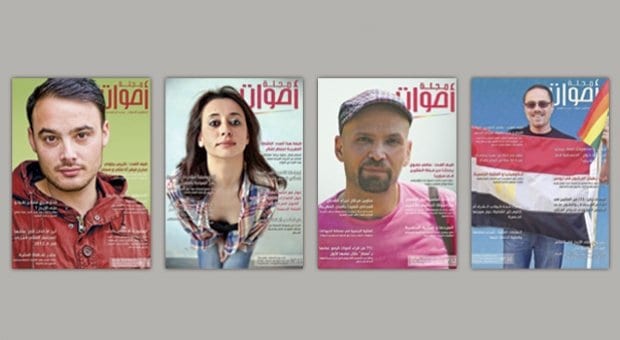
A selection of covers from Aswat, an online Moroccan LGBT magazine. Credit: Xtra file photo
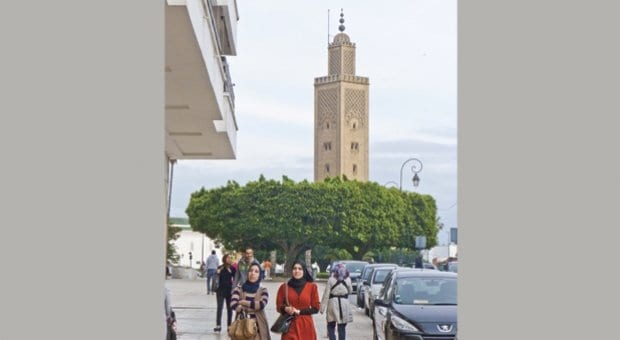
The As-Sounah mosque towers over the city’s main artery, Avenue Moulay Hassan. Credit: Ruby Pratka
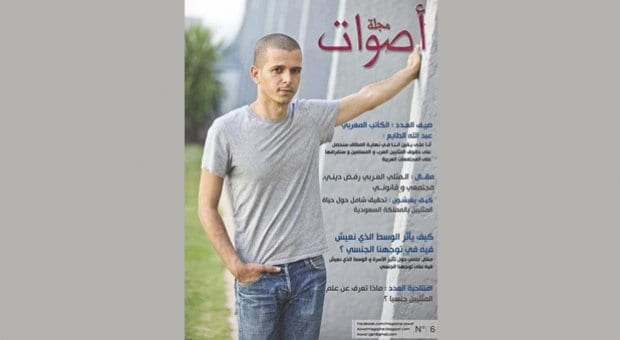
Author Abdellah Taïa, on the cover of Aswat. Credit: Xtra file photo
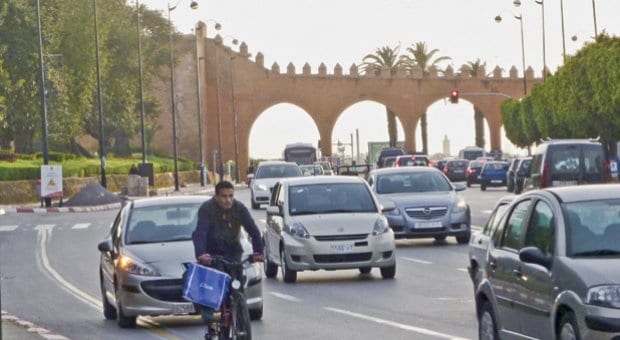
Rabat, the second largest city in Morocco, is an administrative centre and a UNESCO World Heritage Site. Credit: Ruby Pratka
The interview has something of a cloak-and-dagger feel about it.
“Nadya,” an elegant social worker in her mid-20s, rushes into a dark and crowded jazz club in downtown Rabat, the capital of Morocco. She finds the foreigner holding the notebook and begins to speak in an urgent whisper.
“We’re going to have to leave; this isn’t something we can talk about in bars,” she says. “I set it up so we could meet in my friend’s flat. Let’s go.”
Only when we leave the bar and begin plodding through Rabat traffic does she begin to talk normally. Nadya doesn’t want her real name used because she fears losing her job if her bosses find out she campaigns, in her spare time, with a few queer and allied friends, for the decriminalization of homosexuality in Morocco.
“My parents don’t know, and no one at my job knows,” she says. “Most people who are gay just live in hiding. I know I’m going to have to ‘come out’ someday, but I’m really scared.”
Here, as in the rest of North Africa, same-sex attraction is truly “the love that dare not speak its name.” The Moroccan criminal code threatens “anyone who commits an indiscreet act or an act against nature with someone of his or her own sex” with a prison sentence of six months to three years and a fine of 200 to 1,000 dirhams ($25 to $125 Canadian). According to data collected by Kifkif, a Spain-based organization advocating for gay rights in Morocco, about 5,000 gay and lesbian people have stood trial on homosexuality charges since Morocco gained independence from France in 1956. In May of this year, two young men in Rabat were sentenced to prison for homosexuality.
Nadya says she knows many young people who have been kicked out of their homes. At 28, she has already moved into her own place but still fears her family’s reaction to her identity. “It would be total panic,” she says. “If they rejected me because of it, that would be a real shame.”
While the Arab Spring of 2011 spawned a protest movement and brought a reformed constitution and a breath of political fresh air to this monarchy, it did not ruffle the official stance on gay rights. Even in a bustling, cosmopolitan city like Rabat, where people of all races live and work and as many women wear the veil as don’t, latent homophobia simmers below the surface. “Phobia” is perhaps more accurately used in the Greek sense than the modern one — people react with fear when the subject is brought up.
“I don’t want to talk about it; it just upsets me,” says one train passenger in Rabat, moving away from the conversation.
“You must be very stupid to pursue this story,” adds another.
Very few civil society organizations address homosexuality. “Even the activists who led us through the Arab Spring reject homosexuality, and organizations who work on other forms of antidiscrimination do not include discrimination based on sexual orientation,” Nadya says. “The Organization for the Fight against AIDS has a gay men’s working group, the Alternative Movement for Individual Liberties [a leftwing protest movement] has touched on it, and that’s about it.”
Nadya participates — with her face covered — in cheeky YouTube videos calling for decriminalization, set to Lily Allen’s “Fuck You.” Inside a cozy Rabat apartment, rented by an actress friend of Nadya’s and filled with young, artistic people, her friends can play the videos on repeat and laugh. Outside, not a chance.
Nadya believes there are many reasons for hostility toward gays and lesbians in Morocco. “Politics, religion and fear enter into it. Women are also afraid, like, ‘You’re a lesbian, so you are going to jump on me.’”
Fear of rejection leads many queer Moroccans to live elaborate double lives.
“My family are religious, pious people … same thing with my colleagues at work who are conservative Muslims. They would not accept this idea; it would take too long to explain,” says Laila E, Nadya’s girlfriend, an administrative assistant. “So I can only be myself with the [queer] community.”
Ishaq Nouri and Marwan Bensaid have taken their double lives one step further. The two wide-eyed 21-year-old computer scientists turned journalists edit Aswat, an Arabic-language LGBT monthly magazine. They each use two different first and last names, with different Facebook accounts and groups of friends to go with each. Ishaq and Marwan are not their legal names, rather the names of their Aswat identities.
“Our friends don’t know what I’m doing; my family doesn’t know what I’m doing,” Nouri says. “We avoid publishing our real names; all of our writers use pen names, and we avoid using photos.”
The magazine talks about sexual health, current events and films; it includes advice on potential problems, such as coming out, and interviews with prominent queer Arabs, such as French-Moroccan novelist Abdellah Taïa and Ludovic Zahed, founder of Europe’s first gay-friendly Muslim prayer room. Twelve people, mostly students, put together the magazine on a volunteer basis, on their own laptops.
“We have no office, and we have to hide what we do from our families,” Nouri says. “With school, it takes a lot of time. We do take risks, but it’s for a good cause.”
“If my parents find out what I’m doing, I’ll have to leave the house and permanently leave the country,” says Bensaid, more cautious and softspoken than his extroverted co-editor.
“In the eyes of the law, homosexuality is a crime,” Nouri says. “And we’ve had problems — Marwan’s computer has been hacked twice, and after another Moroccan magazine did a story on us, an imam posted a video on YouTube saying we would burn in hell. But if we were scared, we wouldn’t be doing it.
“With the magazine, our goal is to raise awareness among gays and lesbians of what’s going on in the community and then approach the general public,” he says. “We need to think about changing people’s mentalities. They think that we’re some kind of criminals; others think we don’t exist in real life.
“We’re here to make things move and to start talking about ourselves,” he continues. “We have to admit that we exist and that people different from us exist and that’s natural. People haven’t realized that yet.”
A print edition remains out of the question. “It wouldn’t be possible to do a print edition,” Bensaid says. “Here in Morocco there are a lot of taboos, a lot of red lines you can’t cross — too many red lines.”
Reporters Without Borders, a Paris-based press-freedom organization, has declared that “religion, the king and the monarchy in general, the country and territorial integrity cannot be questioned” in the country’s press.
With the print media and the public space closed off, the Moroccan LGBT movement is a child of the internet; of forums like lgbtmaroc.com and gaymaroc.net, which have hundreds of members; of Facebook groups and websites; of online magazines like Aswat and its predecessor, Mithly. According to Nouri, Aswat now has 5,400 unique visitors a month.
“The whole movement started virtually, through Facebook and other social networks,” says Laila E. “You get to know one person, that person gets to know others and it gets bigger.”
“Having a public [offline] event like a Pride would be much more challenging. I’ve dreamed about that, but it’s not a realistic dream.”
There is no separation of faith and state in the Islamic monarchy, where the reigning king, Mohamed VI, is considered to be the “commander of the believers” and a descendant of the Prophet Muhammad. During Ramadan, the holy month during which observant Muslims fast and pray throughout the daylight hours, restaurants are legally forbidden from serving food to adult Muslims.
Although the current king has decreed the equality of men and women, Islam remains inextricable from politics and law.
“Religion blocks us from making progress, because in this country you can’t legalize something which is forbidden by religion,” Nadya says. “Hopefully, in a few years we will be able to put in place secularism; that would open the door to a lot of other things.
“To come out is to be a pariah; it’s difficult to find work,” Nadya continues. “Already I’m somewhat rejected because I keep my hair short and I’m unmarried at 28. But I have an advantage in that I’m financially independent. Most young people still live with their parents, and we know a lot of people who have been kicked out. There’s no group that is working on that issue specifically; people talk among themselves.”
Nadya says that as a lesbian she has had less difficulty finding and keeping a job than her male or transgender counterparts.
“I’m lucky, because I can pretty much go unnoticed. The ones who have the most trouble are gay guys and transgender people,” she says. “Where I went to university, I knew someone who was gay. He wasn’t able to find work even though we’d gone to a very good university and our field was very much in demand; everyone in my graduating class got work except for him. You can imagine, there are people who have a really difficult time because of this. For transgender people, prostitution is the only option.” It’s an option with its own dangers, of course, as prostitution and consensual sex out of wedlock are both crimes in Morocco.
“One of the reasons people condemn homosexuality is because people associate it with prostitution, because some people use it for prostitution,” Nadya adds.
Fortunately, unlike in some southern African countries, violence and death threats are not part of daily life for these activists.
But other forms of intimidation can be scary, especially for trans people and those who don’t dress according to gender norms.
“There is violence; it’s verbal above all, but it can be physical,” Nadya says. “I personally haven’t had to deal with any violence, but I had a girlfriend whose orientation was very visible, and people would call her ‘brother’ in the street; it was really quite scary.
“If you do get physically attacked, the people who attack you have absolute impunity. Because the law does not protect you, you can’t go file a complaint with the police. It’s like being an illegal immigrant. Because there’s no law; it’s the law of the jungle.”
Despite the Arab Spring and the increasing liberties taken by other minority groups in the country — for example, atheist groups who have become increasingly visible — the young activists can’t imagine a Pride in the streets of Marrakesh or Tangier anytime soon.
“We want to get together, to mobilize and to tell people that we are normal, that being homosexual is not a psychological disorder,” Nadya says. “We need to work things out with our families, our friends and ourselves before starting a movement. Are we ready for the consequences of rejection?”
For Nouri, the Arab Spring has planted a welcome seed of dissent in the public sphere in Morocco. If atheists and religious dissenters now dare to eat in public during Ramadan, how unrealistic is a public LGBT event? “It’s still impossible under the law,” he says, “but people have become more courageous. People are starting to fight for good causes; there is a little seed of a movement. Now we can express ourselves better. Nothing concrete has changed, but we can say, ‘We’re here, we exist.’”
A talk with Abdellah Taïa
The man hailed as Morocco’s first openly gay author
Known as the first Arab writer to publicly declare his homosexuality, Abdellah Taïa grew up in Rabat, where poverty and queerness both stunted and stoked his literary ambitions.
Today, as he edges into his 40s, his work has become a necessary, and perhaps unique, bridge between the Arab world and the West. To the English-speaking world, his best-known work is his autobiographical novel Salvation Army — a brief and heart-wrenching account of his coming-of-age and eventual departure from Morocco. By speaking unabashedly about sex tourists, the latent sexuality of invisible populations, and his first contacts with a bewildering Europe, Taïa scandalized the Moroccan press even while he won international acclaim.
The English translation of his new novel, Infidels, will be published this spring. On Oct 23 he participated in the Beyond Queer event at the Vancouver International Writers Festival. —Michael Harris
Xtra: Your Wikipedia page says you’ve been in self-imposed exile from Morocco since 1998. Is that what it feels like? Exile?
Abdellah Taïa: To be honest, I’m not totally comfortable with the expression “self-exiled.” But I did decide, when I was 13, to go one day to Paris in order to be who I am: a free individual.
Being gay has become integral to your identity as a writer. Do you think this will change as your career develops?
No, this will never change. I create from a world that I know very intimately — what’s happening inside of me. Homosexuality is here, in me, in that world. But homosexuality is not my subject; it’s a subject for everyone, even for heterosexuals. I don’t say to myself that I have to write about homosexuality. This very important part of me simply comes out every time I write, in a very natural way.
And that gay identity intersects with class and cultural background. All these parts of you sort of run into each other in your writing. Is there a hierarchy, do you think, between these aspects of identity?
There’s no hierarchy at all. Never. There’s a lot of chaos, in my head and on the paper. Everything is mixed up: politics, sexuality, love, social problems … What’s very important for me is to succeed in finding the right form for this endless chaos. To find a little phrase with a certain rhythm. Not to be descriptive, but to be poetic. And to never, never let go until the end of the story.
Watch Xtra’s video interview with Taïa.
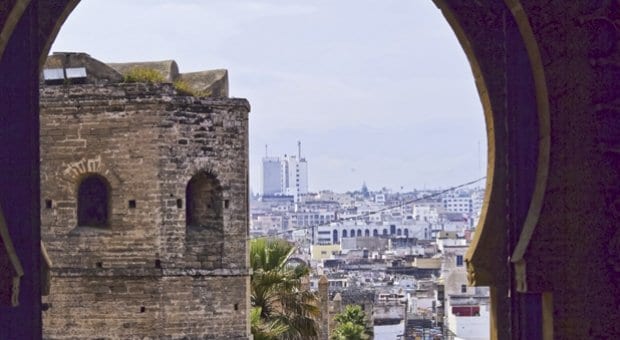

 Why you can trust Xtra
Why you can trust Xtra


